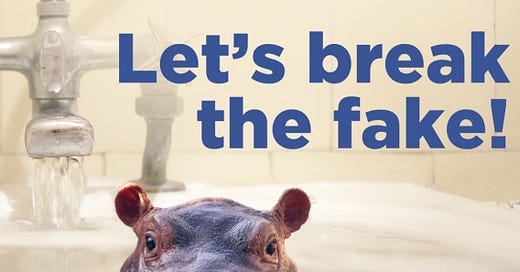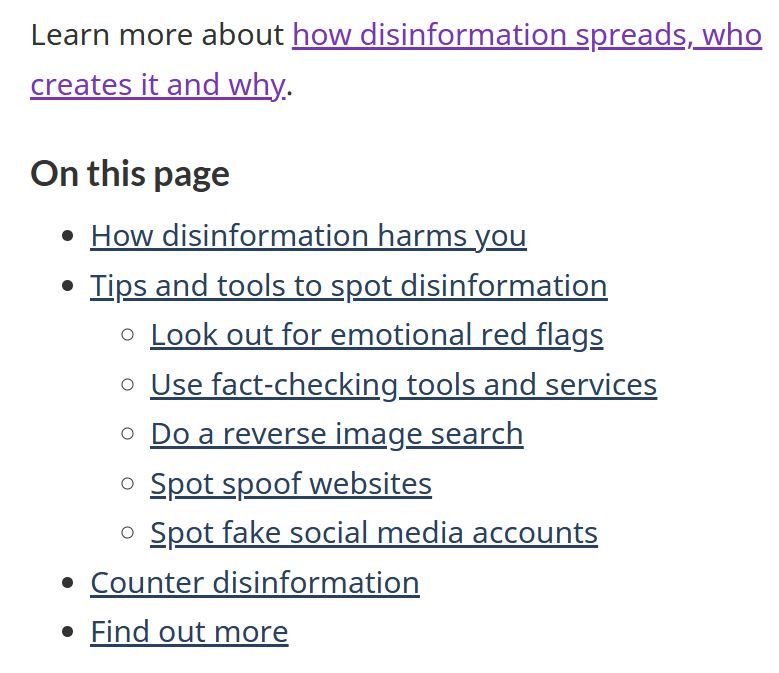On the front lines of combatting lies and ignorance
Is Canada in urgent need of better civic education and more fact-checking and explanatory journalism?
The image is a screen grab from the website of “Break the Fake” run by Media Smarts, a program of Canada’s Centre for Digital Media Literacy. The “house hippo” is the star of many of the short educational videos on the site.
On Monday, we cross-posted an article called « Dark Patterns and the New Propaganda », by
. As you may recall, we introduced that piece by saying the following: “Lies will travel 10 miles before truth has time to put its boots on. An old adage but the tools of deception have never been more powerful and destructive.” Today, we ask how Canadians can get their boots on more quickly — and not just any boots but sturdy, well-polished ones.The answers appear to lie in several directions. For one, Canadians will need to up their capacity — through civic self-education, learning from experience, and, for children, through being taught in school — to read with discernment about sources and where to go to check the veracity of what they read before assuming its truth. Consider here the Government of Canada entering into the civic education space as part of trying to combat our era of misinformation and disinformation. The easy-to-remember link Canada.ca/Disinformation leads you to a portal with a range of information and links. Below is a screen image of the basic sections found on that website:
The federal government is also co-funding a non-profit called Media Smarts that has created a “Break the fake” (breakthefake.ca) website based on research that shows the educational value of short videos for building people’s skill in spotting and in choosing not to pass on disinformation.
And we can learn from elsewhere. Here is a fascinating report in the Guardian from five years ago about Finland: “How Finland starts its fight against fake news in primary schools.”
Also, we would all benefit from some sort of quantum leap in a renewed journalism of fact-checking, disinformation spotting, and lie rebuttal. Almost a year ago (June 2024), the respected CBC political journalist,
, penned an important essay on explanatory journalism that we highly recommend: “A few thoughts on political journalism.”Here’s a brief short nugget on fact-checking:
There’s a lot to be said for exposing falsehoods. If anything, Canadian political journalism could use a lot more of the purposeful fact-checking that has become such an engrained part of the American political ecosystem — not because fact-checking can single-handedly save democracy, but because truth and fact are vital to democracy. The idea that shared facts are essential to a democracy might sound trite, but it also might be true. But despite a few scattered efforts and experiments, there is currently no Canadian equivalent to PolitiFact, the American outlet first launched in 2007.
For another way to put on our truth boots, we should as citizens want and ask for more explanatory journalism of the sort Wherry makes the central focus of his piece. This is journalism that goes beyond fact-checking and sees its job as helping us to be better informed citizens so that we can more fully participate in our self-governance. Wherry, again:
[F]or the sake of building a strong smart and healthy democracy, political journalism would help voters understand …that [for example] if there is going to be a political debate about debt or spending or taxation, there are serious arguments, choices, trade-offs and risks that political journalism should cover and explain. For the sake of building a stronger, smarter and healthier democracy, political journalism would put those questions and facts front and centre and tackle them with nuance, context, depth and breadth.
…
Ideally, I think, political journalism would hold the powerful to account and relay the news of the day while consistently and thoughtfully putting front and centre the potential consequences and ramifications of political actions and words. It would try to help voters understand as much as it reports. It would consciously aim for a better, smarter debate. It would prioritize depth, breadth, context and nuance. It would understand that very real things are very much at stake and aim to help voters understand the very real things that are very much at stake.
Crucially, there is also a surge of specialized fact-checking and explanatory journalism by non-professional journalists especially on platforms like Substack. We select as one Substack example the work of
.Here is his essay-length analysis of the travesty of a White House press conference (aka, ambush) between Trump and President Ramaphosa of South Africa — “The Myth of White Genocide in South Africa; A Deeper Look at the Actual Facts.” Sellers carefully and thoroughly dissects and decimates the lies and delusions in Trump’s claims made to Ramaphosa and in Trump’s bizarre narration of a video he ordered shown during the press conference — about supposed “white genocide” or “white Afrikaner genocide” or “white Afrikander farmer genocide.” Sellers produced this for the very next morning after the ambush. The more we can find — and know to check — citizen journalism sources like Sellers, the more we can get on our truth boots on a timely basis, well before the lies have a chance to travel 10 miles.
Do you have sources — fact-checking, explanatory journalism - that you would recommend? If so, please share them in comments online so that we might add some of them to the list below. We will update this list as comments come in.
Feel free also to comment on any in the below list, if you have experience using them.
Fact-checking journalism list - some recommendations:
Media Smarts Factcheck (discussed above as the creator of the Break the Fake website)— includes a search engine that does a meta search across selected fact-checking sites (notably, Politifact, AFP Fact Check, and Snopes) when you insert key words; try for example “white Afrikaans genocide” and see what it turns up
AFP Fact Check — a department of a leading global news service, Agence France Press (AFP); English as default, but searches available in dozens of languages
Snopes.com - “Snopes got its start in 1994, investigating urban legends, hoaxes, and folklore. As demand for reliable fact checks grew, so did Snopes. Now it’s the oldest and largest fact-checking site online, widely regarded by journalists, folklorists, and readers as an invaluable research companion.”
Politifact.com - US-focused, run by Poynter Institute which focuses on the intersection of news, truth and democracy; “our only agenda is to publish the truth so you can be an informed participant in democracy”
International Fact Checking Network - train yourself to be a skilled fact checker with a free short course (Hands-on Fact-checking: A Short Course) and/or a free training webinar (Fact-Check It: Digital Tools to Verify Everything Online)
Daniel Dale / CNN - Canadian journalist who is a senior reporter in CNN's Washington Bureau, where he fact-checks political claims.
“About That” with Andrew Chang - CBC journalist goes beyond the headlines and explains the major news stories everybody is talking about.
Deeper Look with Michael Sellers - “On my Substack, my goal is to bring an intelligence officer and investigator’s evidence-based mentality to the issues that are in front of us. My ‘niche’ is to be a quiet, reliable, fact-based voice of reason and reliable analysis.”
***
On Friday, we cap off this week’s focus on disinformation, misinformation, and democracy by looking at efforts underway to create publicly-owned social media platforms.





Glad to see this topic coming up because it is a serious roadblock. Disinformation is one thing. But as a former newspaper reporter, editor and a broadcaster, sloppy mainstream news feeds the internet alternatives of disinformation. I view this as a serious impediment to the dissemination of truth.
I believe this is more than overdue. I can't believe the stuff that people believe on Facebook and the hate and anger that is being spread over lies. So, so many truly believe that we don't have a far right movement in this country. We need education and we need it fast.